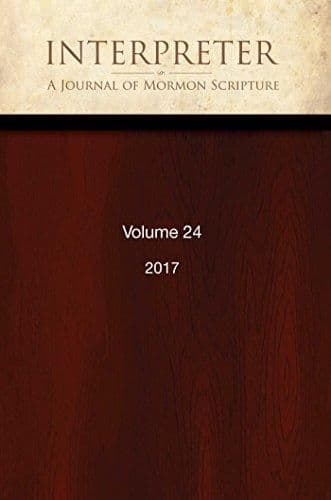Journal
Onomastic Wordplay on Joseph and Benjamin and Gezera Shawa in the Book of Mormon

Title
Onomastic Wordplay on Joseph and Benjamin and Gezera Shawa in the Book of Mormon
Publication Type
Journal Article
Year of Publication
2016
Authors
Bowen, Matthew L. (Primary)
Journal
Interpreter: A Journal of Latter-day Saint Faith and Scholarship
Pagination
255-273
Volume
18
Abstract
The Book of Mormon contains several quotations from the Hebrew Bible that have been juxtaposed on the basis of shared words or phrases, this for the purpose of interpreting the cited scriptural passages in light of one another. This exegetical technique — one that Jesus himself used — came to be known in later rabbinic times as Gezera Shawa (“equal statute”). In several additional instances, the use of Gezera Shawa converges with onomastic wordplay. Nephi uses a Gezera Shawa involving Isaiah 11:11 and Isaiah 29:14 twice on the basis of the yāsap verb forms yôsîp/yôsīp (2 Nephi 25:17 and quoting the Lord in 2 Nephi 29:1) to create a stunning wordplay on the name “Joseph.” In another instance, King Benjamin uses Gezera Shawa involving Psalm 2:7, 2 Samuel 7:14, and Deuteronomy 14:1 (1–2) on the basis of the Hebrew noun bēn (“son”; plural bānîm, bānôt, “sons” and “daughters”) on which to build a rhetorical wordplay on his own name. This second wordplay, which further alludes to Psalm 110:1 on account of the noun yāmin (“right hand”), was ready-made for his temple audience who, on the occasion of Mosiah’s coronation, were receiving their own “endowment” to become “sons” and “daughters” at God’s “right hand.” The use of Gezera Shawa was often christological — e.g., Jacob’s Gezera Shawa on (“stone”) in Jacob 4:15–17 and Alma’s Gezera Shawa on Zenos’s and Zenock’s phrase “because of thy Son” in Alma 33:11–16 (see Alma 33:4 17). Taken together, these examples suggest that we should pay more attention to scripture’s use of scripture and, in particular, the use of this exegetical practice. In doing so, we will better discern the messages intended by ancient prophets whose words the Book of Mormon preserves.
Subject Keywords
Bibliographic Citation
Terms of use
Items in the BMC Archive are made publicly available for non-commercial, private use. Inclusion within the BMC Archive does not imply endorsement. Items do not represent the official views of The Church of Jesus Christ of Latter-day Saints or of Book of Mormon Central.